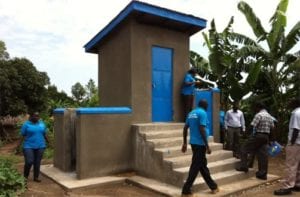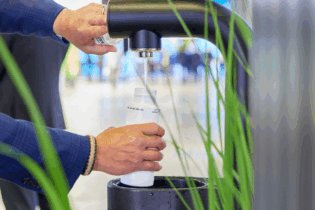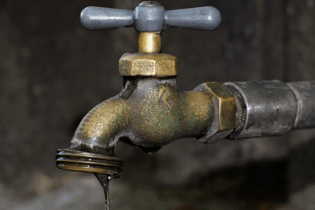The African Development Bank (AfDB) recently commemorated World Toilet Day with the release of encouraging results of a Community Led Total Sanitation program in two African countries.
In Uganda, there is strong will and AfDB support to end “flying toilets” locally called “kaveera”, the practice of defecating in a polythene bag and throwing it away. The program led by the Ministry of Water and Environment has focused on building Ecological sanitation (Ecosan) toilets at household level and water-borne toilets in public hotspots like markets and bus stops. “On the issue of sanitation, I want to commend African Development Bank and our government for rescuing us from “kaveera toilets. Public toilets will go a long way in keeping Kasanje clean and free of water borne diseases like cholera and typhoid which are usually rampant in the rainy season,” says the Mayor of Kasanje Sub County, Wakiso District, Charles Kituka. The Government of Uganda has been awarded a €4-million RWSSI Trust Fund grant and a €50-million AfDB loan. In Mozambique the National Rural Water Supply and Sanitation Program (Pronasar) led by the government is using the Community Led Total Sanitation (CLTS) approach to help end open defecation in Nampula and Zambezia provinces.Identifying “Natural Leaders”
The CLTS approach consists of identifying “Natural Leaders” and then training them to help raise awareness about how faeces in the environment can impact their health.The community leaders receive support in the form of actions to promote hygiene and sanitation and demonstration centres where they encourage communities to change their attitude towards open-defecation.
Over the 15-month period of an on-going contract with certified CLTS staff, Open Defecation-Free status has been achieved by 69 communities in Nampula Province. CLTS staff report 82 000 household toilets under constructions, and a strong impression that the pioneer communities will create a snowball effect when the health benefits, particularly a reduction in diarrheal disease, become widely acknowledged. The Deputy National Director at the National Directorate for Water, Helio Banze, confirmed that the project will be expanded beyond the current pilot provinces, to include Niassa and Cabo Delgado provinces. The AfDB is supporting Mozambique government’s efforts through a €6-million Rural Water Supply Sanitation Initiative (RWSSI) Trust Fund grant and a € 6-million African Development Fund (ADF) loan.






